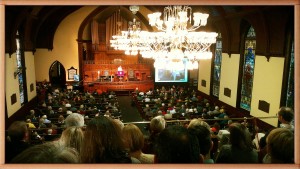 The NEXT Church gathered in Charlotte, North Carolina, last week. After a 2011 inaugural gathering in Indianapolis and a Dallas follow up in 2012, many people were eager to see in Charlotte what a more organized (and much bigger) NEXT Church would feel like.
The NEXT Church gathered in Charlotte, North Carolina, last week. After a 2011 inaugural gathering in Indianapolis and a Dallas follow up in 2012, many people were eager to see in Charlotte what a more organized (and much bigger) NEXT Church would feel like.
I’ve been to all of these gatherings now. I wrote about the first one here and here and here. Posts about Dallas can be read here and here. It should be obvious that I’m a fan of this movement and its emphasis on sharing life-giving practices to move the PC(USA) into the future. NEXT is built to create, not complain. I love that.
Here’s what NEXT 2013 suggested in next:
- Worship
- Failure
- Invitation
- Creation
Worship
Ashley Goff from the Church of The Pilgrims in Washington, D.C., described liturgy as “Improv,” a force for creating spontaneity, unscripted moments, and newness. We watched video clips from her church where worshipers were led on a walking meditation around the Lord’s Table and then constructed, en masse, the Great Prayer of Thanksgiving.
Casey Wait Fitzgerald became Mary, Jesus’ mother, as she showed the gathering what Biblical storytelling can do to a worship service.
And the gathering worshiped. NEXT gatherings are worship services. In fact, a person who could only come to the structured worship times at a NEXT gathering would get as clear a glimpse into what’s “next” as a person who attended every workshop. The incomparable Theresa Cho and a team of musicians, preachers, and liturgists curated four distinct liturgical events that embodied the most enduring formations of Presbyterian worship heritage as well as the most exciting emerging practices.
[A caveat: one of the preachers actually raised some hackles. Good, good, good, I say. My hackles were raised, and I was made to think, listen, protest, and then catch my breath. That’s what worship should make you do.]
Failure
NEXT wants to speak to the undeniable failure of Presbyterianism to thrive as an institution since, say, the 1960’s. “Why don’t Presbyterians build hospitals anymore?” was the question that practically gavelled the 2011 event to order.
But for all of its clear-eyed analysis of the demographics and statistics and . . . sins that have hobbled the denomination, the organizers of NEXT are offering something useful and constructive to the church: encouragement to fail. What’s more, NEXT wants to show in these gatherings what failure can do to re-birth the church.
“If you’re not failing, then you’re not learning. And if you’re not learning, then you’re not progressing in the work,” said Frank Yamata, President of McCormick Theological Seminary, on a panel exploring Shared Leadership.
The Administrative Commission has come to embody failure as much as anything in the contemporary church, and yet Bill Golderer and Aisha Brooks Lytle told the compelling story of how they have embraced and empowered an AC to do amazing work through Broad Street Ministries. Aisha took it a step further, recommending that pastors–for the sake of growth and accountability–ought to consider forming their own personal AC’s.
I’m on board. I wonder if Aisha would be on mine.
The next NEXT post will share the Invitation and Creation insights I gleaned from the gathering.
Rocky – what a great summary. It gets me so pumped about what’s hapoening!! Looking forward to reading the next post.
Thanks, Mihee. I actually listened to the God Complex Radio interview with you on my iPod during my flight!
Heh… I did the same thing Rocky! Good stuff.
Rocky! Good for you to be so engaged with your job. I mean, it’s supposed to be more than a job…but it’s still a job, and I am sure that it is as full of annoying little details as most jobs. But I love that you are reaching and exploring for how to make this better.
In *my* IT job, there is a saying about new technology start-ups. “Fail fast”…which means, go all out in the direction you feel like you should go, even if partway through you get the idea that maybe it’s not what you hoped. Peg the needle, and then you will explore what that effort had to offer quickly, abandon it once you figure out that it’s not what it was supposed to be. Get to FAIL fast, then move on to the next thing because success is inevitable.
Also, putting lots of effort into something is it’s own version of success too.
It’s interesting to see the same concept (sort of) mentioned in the context of the church.
way to go!
-Murphy
Murphy, I’m tickled at this. Church folks like to use tech metaphors–my friend even wrote a book called “The Open Source Church”–but you actually live in this world. Your comment gets right at some of the stuff people shared at this event: fail fast, then pivot. Failure actually needs to be built into your planning. As you can imagine, that works against the grain of a lot of contemporary thinking, which instead wants to be safe and conserve what we already know. You must have read “The Lean Startup,” then? That book got quoted a bit here.Thanks Murphy!